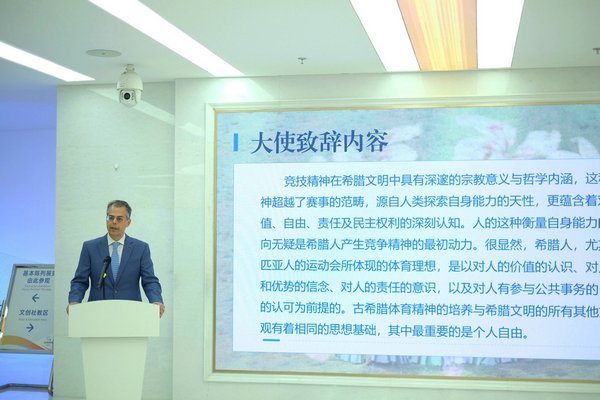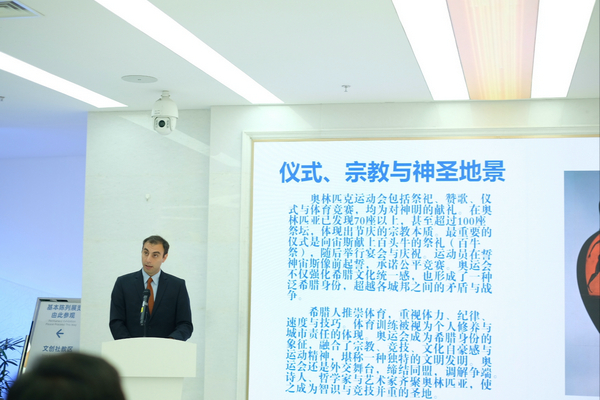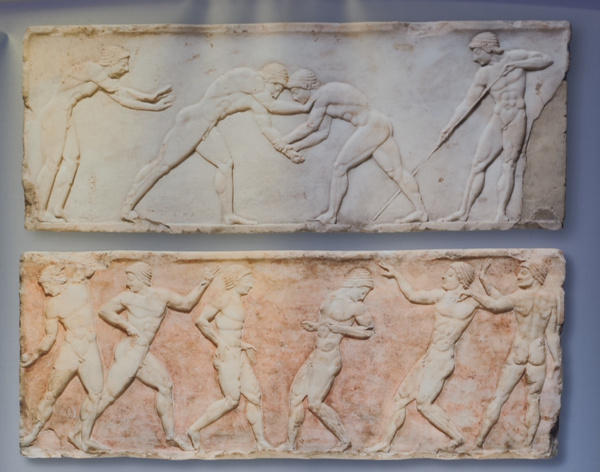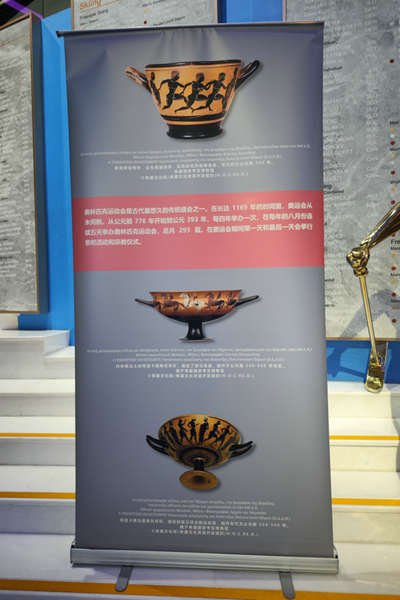Beijing photo show explores over 2,800 years of Olympic heritage

Greek Ambassador to China Evgenios Kalpyris addresses the opening of an Olympics-themed photo exhibition at the Beijing Olympic Museum, on June 13, 2025. [Photo by Yang Xiaoyu/chinadaily.com.cn]
Civilization Dialogue: Eternal Olympic Flame—From Ancient to Modern Olympic Games, a photo exhibition showcasing the profound legacy of the Olympic Games, is currently underway at the Beijing Olympic Museum.
Co-organized by the Greek embassy in China and the Beijing Olympic City Development Association, the exhibition, traces over 2,800 years of Olympic heritage, from their origins in 776 BC to the revival of the modern Games in 1896 and up to the 2024 Paris Olympics.
Featuring 15 banners showcasing rare historical photographs and archaeological artifacts, the display highlights key moments in the evolution of Olympism, such as the birth of the modern Olympic Movement, the introduction of the marathon race to the modern Olympics, and the journeys of the Athens Games in 1986 and 2004.
In his opening remarks, Greek Ambassador to China Evgenios Kalpyris said, "The exhibition offers a rich presentation of important moments in Olympic history and is a powerful reminder of the common Olympic traditions that unite Greece and China."
"Until this day, I still vividly remember in 2001, together with cheering crowds on Tian'anmen Square, I, as a young diplomat at the Greek embassy in China, witnessed the historic moment when China won the right to host the 2008 Summer Olympic Games," Kalpyris recalled. "Beijing had since kept the tinder of the Olympic spirit, and successfully hosted the Winter Olympics in 2022."

Greek-Dutch archaeologist Alexander Westra gives a lecture on the legacy of the Olympic Games at the Beijing Olympic Museum, on June 13, 2025. [Photo by Yang Xiaoyu/chinadaily.com.cn]
During the exhibition's opening on June 13, Greek-Dutch archaeologist Alexander Westra, a post-doctoral researcher at Henan University in Kaifeng, central China's Henan province, gave a lecture titled "From Olympia to the World: The Legacy of the Games," tracing the evolution of the Olympic Games from their origins in ancient Greece to their modern global significance.
Westra noted that archaeological evidence indicates that athletic competitions in ancient Greece, such as chariot racing, wrestling, boxing, and foot races, date back to the Mycenaean and Minoan eras—contemporary with China's Xia and Shang dynasties (approximately 2100 BC to 1100 BC). These athletic activities were likely associated with funeral rites and religious ceremonies.

Ancient Greek marble relief sculptures featuring various athletic competitions. [Photo by Yang Xiaoyu/chinadaily.com.cn]
He also highlighted the significance of the ancient Olympic Games, which began in 776 BC, as a unifying force during Greece's fragmented Geometric Age (about 900-700 BC). These games played an important role in honoring Zeus, the king of the Olympian gods, and in fostering a sense of pan-Hellenic identity through their religious and cultural aspects.
For nearly 12 centuries, until they were abolished by Theodosius I in 393 AD to promote Christianity, the ancient Olympics were held every four years at Olympia, gathering the fittest men from different Greek cities to celebrate human's pursuit of excellence and virtue (arete), with equality and fair competition (agon) central to the Games' spirit.

Pictures of artifacts related to the ancient Olympic Games are on display at the Beijing Olympic Museum, on June 13, 2025. [Photo by Yang Xiaoyu/chinadaily.com.cn]
The archaeologist said that thanks to French educator Pierre de Coubertin, who founded the International Olympic Committee (IOC) in 1894, the core values of the ancient Olympic Games, after a 1,500-year hiatus, were revived and modernized as the first modern Games were held in Athens in 1896.
Westra said that both the ancient Games and their modern equivalent, which are no longer religious and far larger in scale and more inclusive, are fundamentally about humans honoring something greater than themselves.
"The ideals of virtue, excellence, and self-improvement remain central. The Olympic spirit transcends mere athletic competition," he said.
"It celebrates humanity's potential, cultural unity, and shared aspirations, inspiring generations to embody values of fairness, excellence, and universal cooperation."
Westra also commended China's increasing engagement with Greek civilization. The scholar, who played an active role in helping establish the Chinese School of Classical Studies at Athens last year, told the China Daily website that the school's founding marks a historic moment in civilizational dialogues and shows China's commitment to the international scholarship of ancient Greece.
Hou Ming, director of the Beijing Olympic Museum, emphasized in his speech that this exhibition strengthens and stimulates the traditional Sino-Hellenic friendship with passion, showing how the Olympic spirit once again unites the two countries.
Running until July 13 at the museum, the exhibition will travel to various Chinese campuses to help more young people connect with Olympic history, according to the organizers.